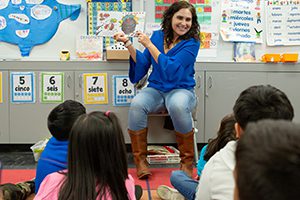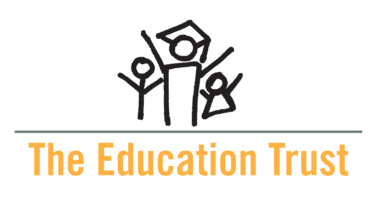Study Finds Teacher Licensure Tests are Mostly High School Level: If This Is All We Expect Teachers to Know, Why do We Make Them go to College?
(Washington, D.C.) A report released today by The Education Trust decries the fact that many states grant teaching licenses without requiring that individuals demonstrate knowledge of the subject area that they intend to teach. The study, Not Good Enough: A Content Analysis of Teacher Licensing Examinations, asserts that even states that require subject area tests for teacher licensure rely on such low-level exams and have set such low passing scores that they exclude only “the weakest of the weak” from the classroom.
According to the report, the absence of rigor in tests is particularly worrisome given new and much higher state standards for students. “That we dramatically ratcheted up our standards for students without insisting on commensurate increases in standards for teachers is a chilling indictment of all of us: K-12 leaders, policymakers, higher educators and advocates. As they say, however, it’s never too late to correct this situation,” said Kati Haycock, Director of The Education Trust.
The study was conducted by a team of Education Trust staff and consultants. The methodology and judgments of the study were reviewed, validated and endorsed by a panel of six distinguished academic experts including:
- Eugenie Scott, executive director of the National Center for Science Education.
- George Miller, senior lecturer emeritus of chemistry at the University of California-Irvine; and
- Gail Burrill, past president of the National Council of Teachers of Mathematics (NCTM), now Senior Program Officer at the National Academy of Sciences (NAS) and associate researcher at the University of Wisconsin, Madison;
- Lynn Arthur Steen, past president of the Mathematics Association of America (MAA) and professor at St. Olaf College, Northfield, Minnesota;
- George Pullman, associate professor of English, Georgia State University;
- Dan Jones, Dean of the College of Liberal Arts, Towson University, Maryland;
Professors Jones, Pullman, and Steen are available today for interviews on this report. They can be contacted through Jeanne Brennan at The Education Trust.
- Too few states test the subject area knowledge of prospective teachers:
- Forty-four states require that prospective teachers take and pass a licensing examination, but only 29 of these require that future secondary teachers take an examination in the subject area in which they plan to provide instruction. (See chart on pp. 20-21.) The remaining states require examinations that cover only pedagogy and the most rudimentary general knowledge and skills. These general knowledge and skills tests assess verbal and mathematical skills at only about the tenth grade level.
- Seven states have no licensing examinations at all for new teachers. (See chart on p. 4.)
- The subject area tests currently in use are too weak to guarantee that teachers have the subject area knowledge that they need to teach to high standards.
The study examines the highest level mathematics, English/Language Arts, and science exams produced by the two major teacher test publishers: the Educational Testing Service (ETS) and National Evaluation Systems (NES). According to the report, the majority of tests could easily be handled by advanced high school students.None of the tests in any of the subject areas examined assessed knowledge at the baccalaureate level.
“The low level of these tests in no way indicates that all teachers are poorly prepared. In fact, our own experience in classrooms around the country proves that many teachers are wonderfully educated. These teachers breeze through insultingly easy licensure exams. But the fact remains that millions of children are being damaged daily by under-prepared teachers because we’ve refused to establish high enough standards for entry into the field of teaching,” said Patte Barth a Senior Associate at The Education Trust and one of the study’s co-authors.
- Highlights of findings on content:
- Elementary education and basic literacy:
Both ETS and NES provide basic literacy or general knowledge tests that are in many states the de facto content test for teaching at the elementary level. The Education Trust analysis found that reading passages generally were on the level of National Geographic – high school level prose, but accessible to middle and upper elementary school students. At least two-thirds of the mathematics items were judged to be middle-school level. A comparison of math topics between Praxis I and NAEP showed that NAEP emphasizes a better balance of mathematics even at the eighth grade level. (See attachment.)
- Secondary Mathematics:
Most of the questions on the Praxis II and NES examinations used to assess the knowledge of prospective secondary school mathematics teachers can be found on high school level mathematics tests. Only a few questions went beyond calculus or addressed concepts typically learned at the college level.
- Secondary English/Language Arts:
The ETS English/Language Arts Content Knowledge test was superficial, mostly concerned with “who wrote what” and “where do you find this”. There were no questions demanding a depth of knowledge that would enable “people to show that they know how to do useful things with what they know.” Most of the material covered in an NES-published examination is taught in college survey courses, but it is well within the reach of high school students.
The essay tests were the highest level test of any considered in this study; even so, the highest level essay only tested for skills and knowledge at about the level of a college junior majoring in English, while most essays were at a first or second-year college level.
While the study’s authors bemoan the fact that none of the assessments for prospective teachers demanded subject knowledge at the college graduate level, they are quick to point out that a bachelor’s degree alone may not certify that the prospective teacher’s content knowledge is relevant to teaching a K-12 curriculum.
None of the tests assessed what the authors call “knowledge for teaching”, which they say involves the deep mastery of an academic subject that goes beyond, but is intimately connected to, the highest K-12 academic standards.
According to Ruth Mitchell, a Principal Partner at The Education Trust and one of the study’s authors, “All teachers, including elementary school teachers, need to understand not only the structure of the academic discipline, but how it contributes to the world. If teachers are going to help all students reach the highest K-12 standards they themselves need a very deep understanding of the subject areas, an understanding that goes far beyond what they are teaching at the moment.”
- State- established passing scores on these exams are too low
Each state establishes its own passing scores on teacher licensing examinations. Although there is wide variation among states, the passing scores in all states are too low. (See charts on pp.13 and 14.) For example, both Oregon and Georgia use the Praxis II Mathematics: Content Knowledge exam for the licensure of prospective secondary school math teachers (a test judged to be at the advanced high school level. Oregon has the highest passing score in the country, 147. Georgia has the lowest passing score in the country, 124. But even in Oregon, a prospective teacher has to answer only about 65% of the questions correctly in order to achieve a score of 147 and begin a career as a high school math teacher. In Georgia a prospective mathematics teacher would only have to answer about 46% of the questions correctly to reach the passing score.
“K-12 students answering 46% or even 65% of the items correctly on a mathematics exam would receive an ‘F’ on that test. Ironically, we are granting individuals teaching licenses for performances that would be deemed unacceptably low for their students. There’s clearly something very wrong here,” said Patte Barth.
- Toward A More Knowledgeable Teaching Force, Recommendations:
The federal government, state governments, school districts, institutions of higher education and the academic disciplinary societies all have a responsibility to act immediately to improve the quality of the teaching force.
Among the report’s recommendations are:
- State-established academic standards for teachers
- Higher passing scores
- Upgraded assessments
- Mandatory academic subject area testing for all prospective teachers
Haycock, who last week criticized the teacher quality standards contained in the Administration’s proposal for the reauthorization of the Elementary and Secondary Education Act, praised the provision in the proposal requiring all states receiving funds under the Act to have subject area examinations for prospective teachers. “While there are some deadly serious flaws in the Administration’s proposal, this is a bright spot. To have real meaning for students, though, these tests must be more rigorous than the tests reviewed in this study,” Haycock said.
“States facing teacher shortages may be hesitant to raise standards for teachers, fearing even more vacancies. But experience shows that bright young people are attracted to competitive professions, not repelled by them. Surely our children deserve the best,” Haycock concluded.











